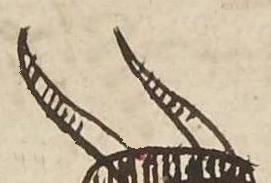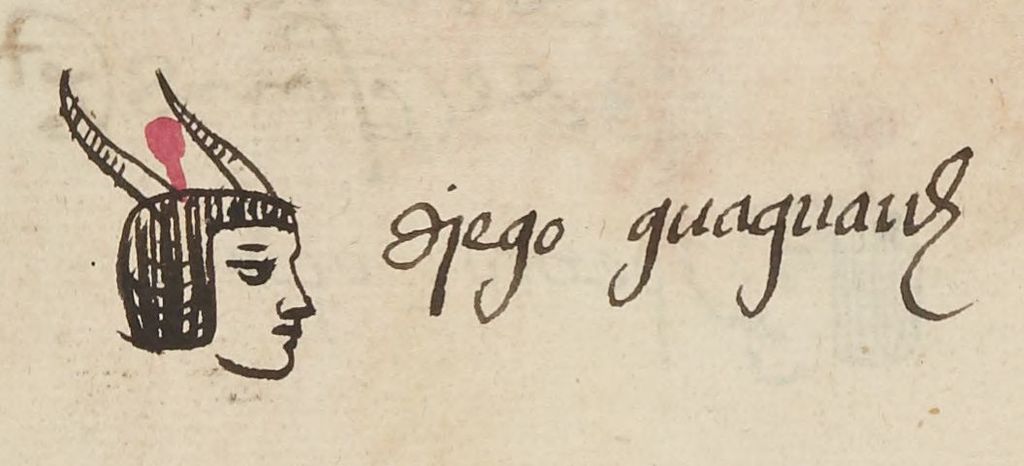cuacuahuitl (MH485r)
This element of the noun for horns (cuacuahuitl) has been carved from the simplex personal name Cuacuauh. This black-line drawing of horns is merged with the head of the man who bears the name. The horns lean backward from the top of his head. They have some texturing on the top two-thirds of the horns. The man's head is shown in profile, facing to the viewer's right.
Stephanie Wood
These horns were frequently associated with oxen, bulls, and cows. Cattle, which roamed fairly freely in the sixteenth century, devouring maize fields, were well known to Nahuas. This consumption or eating is perhaps incidentally reflected in the name they were given, which has cua, to eat, reduplicated. In European culture, cows are known for "chewing their cud." There is also a worm, the ocuilin cuacuahue. The definition from Alonso de Molina emphasizes its "little horns" or "feelers" (cuernezillos in Spanish), rather than its tendency to eat a lot. See our Online Nahuatl Dictionary. Juan José Batalla Rosado (El Arte de Escribir, 2018, 76) includes the cuacuahuitl ("cuerno de animal") in his list of visual loans. He finds the Matrícula de Huexotzinco to show the greatest degree of Western influence of all colonial codices.
Stephanie Wood
diego guaguauh
Diego Cuacuauh
Stephanie Wood
1560
Xitlali Torres
horns, antlers, cuernos, astas, cattle, ganado

cuacuauh(tli), horns/antlers, https://nahuatl.wired-humanities.org/content/cuacuahuitl-2
cuacuahue, ox, bull, cow, or other horned animal, https://nahuatl.wired-humanities.org/content/cuacuahue
ocuilin cuacuahue, worm with little horns or feelers, https://nahuatl.wired-humanities.org/content/ocuilin-cuacuahue
los cuernos, los astas
Stephanie Wood
Matrícula de Huexotzinco, folio 485r, World Digital Library, https://www.loc.gov/resource/gdcwdl.wdl_15282/?sp=45&st=image.
This manuscript is hosted by the Library of Congress and the World Digital Library; used here with the Creative Commons, “Attribution-NonCommercial-ShareAlike 3.0 License” (CC-BY-NC-SAq 3.0).



